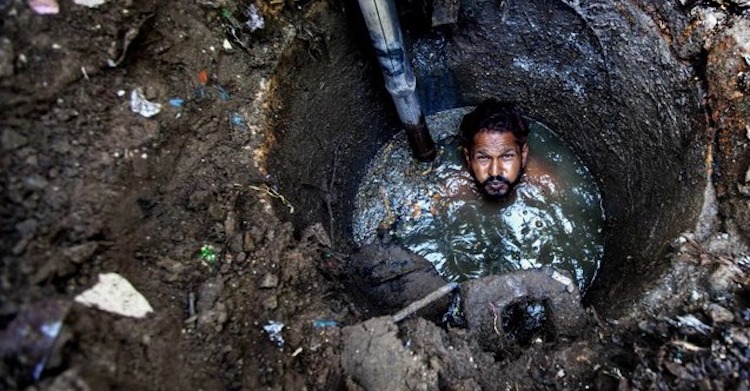
Special IDN SDG News Feature*
BENGALURU, India, 3 May 2023 (IDN) — India’s southern state of Karnataka is due to go to the polls on May 10, and sustainable development goals (SDG) issues such as sanitation, food security and free nutrition for the poor, free housing sites for the homeless and free cooking gas cylinders for the poor are top billing in the ruling Bharatiya Janata Party (BJP) election manifesto released on May 1.
An interesting item in the election manifesto is the eradication of manual scavenging in the state an issue that has bugged the state for years. This is an occupation that has been assigned to the low-caste Dalit population for centuries in the caste-driven society of India. In modern India, dry toilets—meaning toilets without flushing sewage systems—are still common in many parts of India and manual scavenging is the effective removal of excreta from the dry toilets which has been linked to forced labour or slavery for years.
The manual removal of human excreta using brooms, small tin plates, and baskets carried on the head has been the assigned occupation of the Dalits. But Dalits themselves are no longer prepared to do this work and Hindu nationalist BJP politicians see it as appropriate to include the eradication of this practice in their election manifesto.
Questions have been asked in India about this practice regarding why people are continuing in this occupation despite the availability of other dignified livelihood sources. Why is manual scavenging in practice in towns and cities where other cleaner options for survival exist?
The Employment of Manual Scavengers and Construction of Dry Latrines (Prohibition) Act, 1993, has prohibited the employment of manual scavengers as well as the construction or continuance of dry latrines. It described this practice as “dehumanizing” and called for municipal by-laws for the conversion of dry latrines into water-seal latrines. Karnataka state legislature has also passed this law.
Manual scavenging still exists in India mainly due to the continued presence of unsanitary latrines where human waste must be cleaned physically, rather than by a machine or sewage system. Many of such unsanitary latrines are dry latrines that don’t use water.
The prohibition of insanitary latrines and employment and engagement of manual scavengers have been banned by another Act—The Prohibition of Employment as Manual Scavengers And Their Rehabilitation Act of 2013. It specifically stated that it is the responsibility of local authorities to ensure the elimination of such latrines.
Speaking at a workshop on March 14 this year, the Karnataka Safai Karmachari (persons engaged in sanitation work) Commission Chairperson Kote Shivanna said that some 90 scavengers in the state have died since 2020 while manually cleaning manholes, septic tanks, and open drainages. He admitted that though the 2013 Act prohibited this employment it still happens and there were 7080 manual scavengers still employed in Karnataka.
Shivanna told the workshop participants that the Bengaluru-based National Law School of India University has been commissioned to do a survey of scavenging workers in the state.
While speaking at the same workshop, Choranahall Shivanna, state convenor of Dalit Sangharsha Samithi, said that surveys have failed to identify all the Safai Karmacharis used as manual scavengers. “The general public tends to employ them by paying a lesser fee since private agencies that use modern technology charge more,” he noted.
A manual scavenger named only as Nagaraj told Deccan Herald newspaper that local bodies have invested in desilting, jetting, and cesspool machines to clear underground drainage blocks, stop manhole outflow, and so on. “But we are used as manual scavengers when complaints spike during the rainy season or when machines can’t be used in narrow lanes,” he explained. “Most of us are not provided hand gloves and safety jackets while entering a manhole or a safety tank.”
It is still not clear if BJP government is re-elected in the state, how they would go about eradicating this age-old menace which is also immersed in the Hindu caste system.
Chairperson of the National Safai Karmachari Commission, Venkateshan said that in case of death due to manual scavenging, officers heading respective local bodies too should be punished. At present, only the contractor is being booked. He also advocates for fines to increase from 100,000 rupees to 250,000 rupees.
* This IDN SDG feature was compiled using resources of the local media reporting of the issue to bring you a local perspective of an SDG issue. [IDN-InDepthNews]
Photo: The manual scavenger has to enter the drains barefoot and without a mask. He ends up inhaling toxic gas and swallowing dirty water, but now considers these as unavoidable occupational hazards. | Photo Courtesy: Vijay Pandey/TwoCircles.net











